8A Unit 5-6 (Grammar 2)
江苏新牛津8A--Unit6--复习总结提纲

江苏新牛津8A--Unit6--复习总结提纲8A Unit6 复习提纲一、短语1、在市场观鸟2、世界上最重要湿地之一3、一年到头4、给许多野生动物提供食物5、导致6、越来越少的空间7、有足够的食物吃8、制定法律去阻止所有这些事情9、数量上的变化10、一年一次11、邀请他们来帮我12、理解湿地的重要性13、结果14、为了15、继续捕鱼16、短暂停留17、拍摄鸟儿的照片18、叫某人不要做某事19、飞往南方越冬20、面积达4530平方公里21、丹顶鹤第二大家园22、去观鸟23、发出悦耳的声音24、在鸟展上25、申请表26、欣赏自然界27、参加活动28、打电话给某人29、给某人发电子邮件二、重点句型1.What’s your favourite bird ?2.What do cranes look like ?3.There are not many cranes left in the world, and 40% of them live in Zhalong.4.This will lead to less and less space for wildlife.5.You’d better take a pair of binoculars.6.What else should I take ?7.Take a notebook with you to write down what you see.8.Birds are part of our lives.9.I would like to join Birdwatching Society.10.I think it is very important forme to do protect them.11.I will be very happy if I can become a member of ….一、听写1、2、3、4、5、6、7、8、9、10、11、12、13、14、15、16、17、18、19、20、二、词形变化1.birdwatch —n. n.(人) 2、rare--adv.3.nature—- adj.4.easy — adv.5.lead —- ved. n.(人)6.fish--- pl. n.(渔民)7.one—-1st. 一次 8.tour--- n.(人)9.describe--- n. 10.different --n.11.clear -- adv. v. 12.visit ---n.(人)13.art–-n(人). 14.science---n.(人)15.cook-- n. n.( 人) 16.win--- n.(人)17.speak --- n.(人) 18.write---n.( 人)三、基础练习A 选择最佳答案---语法1.Please tell the students ________quiet in class.A.keepB.keepingC.to keepD.keeps2.---Do you enjoy ______a volunteer?--- If you want ______this, you’d better join us.A. being; knowingB. to be; knowingC. being; to knowD. to be; to know3. Try to sing more English songs, and you will find it interesting________a foreign language.A learning B. learns C. to learn D. learned4. ---Let me help you carry the box, Granny.---Thank you, Li Lei. It’s very nice _____ you _____ me.A. of; to helpB. for; to helpC.of; helpingD. for;helping5. Jim decided ________ for a walk in the forest.A.goB.to goC.goingD.goes6. Tell the children _______unhealthy food. It’s bad for their health.A. not to eatB. not eatingC. to eatD. eating7. Colors can change our moods(情绪) and make us _______happy or sad.A. feelB. to feelC. feltD. feeling8. The teacher often told Mike ______ too much time playing computer games.A. not to spendB. to not spendC. doesn’t spendD. not spend9.--- Remember _______to my daughter’s dance show next Friday.---Of course I will. I’ll never forget ______her dance for the first time this year.A. to come; to seeB. coming; to seeC. to come; seeingD. coming; seeing10.China plans to let tourists ______the Xisha island in the south China Sea this ye ar.A. visitB. visitsC. visitingD. visited---单元句型短语()1. ---–What do you think of nature reserve youvisited last weekend?-- -It’s great. It is ideal home for wildlife.A. the ; aB. the; anC. a; anD. an; an ( ) 2. Birds can find food _____ now than before.A. easyB. easierC. easilyD. more easily ( ) 3. I think ____necessary for us _____the birds.A. it , protectB. its, to protectC. it’s , protectingD. it , to protect( ) 4. The red-crowned crane is one of _______ in the world.A. a rare animalB. the rare animalC. the rarest animalsD. the rarest( ) 5. The boys made ___, so their teacher got very _______.A. much noise, angrilyB. much noise, angryC. many noise , angrilyD. many noise, angry( ) 6. ----The number of the tigers is getting __________.---- I agree _______ you.A. more and more , toB. smaller and smaller, toC. smaller and smaller, withD. more and more ,with ( ) 7. The rich man __________ much food__________ the poor families during the hard time.A. provides, toB. provides, withC. provided, withD. provided, for( ) 8. Do you need more people___ you_______ the bird count?A. help; doB. to help; doC. help; to doD. to help; doing ( ) 9.Some can make different bird .A. acts; soundsB. acts; voicesC. actors; soundsD. actors; voices( )10. It will be______ tomorrow, so there will be a lot of_______ tomorrow.A. rain, rainB. rainy, rainC. rain, rainyD. rainy, rain( )11. Many birds live in Zhalong Nature Reserve .A. all round yearsB. all year roundC. round all yearD. the all years round( )12. fit, she eats little every day.A. KeepB. KeepingC. KeepsD. In order to keep( )13. Today the forests are getting fewer and fewer. We must __________ down too many trees.A. keep people from cuttingB. prevent people from cuttingC. stop people cuttingD. all the above( )14. The prices are rising(上升) too high. So the government has to do something it.A. stopB. stoppedC. to stopD. stopping( )15.What do you think we can do wild birds?A. protectB. protectingC. to protectD. protects ( )16. There _____lots of fish in this river, and birds catch ______for food.A. are, themB. are , itC. is, itD. is , them ( )17. Look at the picture. Can you see some boys __________ basketball?A. playsB. playC. playedD. playing( )18. He made a fire _______ himself _______ warm.A. make; to keepB. to make; to keepC. to make; keepD. make; keep( )19.She did what she could _______ us. Though 3,000 dollars is a lot of money for her.A. helpB. helpedC. helpingD. to help( ? )20. I don’t know if he __________. If he __________,I will let you know as soon as possible.A. comes; comesB. will come; comesC. will come; will comeD. comes; will comeB.根据汉语写词或用所给词的适当形式填空:1.Zhalong Nature Reserve is one of the world’s mosti _________ wetlands.2.Most birds are a______ in the daytime,3.Some people want to make more s_______ for farms and houses.4.The Chinese g_________ has had some rules and policies to protect children.5.Zhalong is a p________ natural place for some rare birds.6.My f________ subject is math. What about you?7.I would like to be a m_______ of the swimming club.8.---Where would you like to go?---I would like to go to the countryside, because I like birds and n______ very much.9.Do you think it is i__________ for me to do something to protect animals?10.We have many after-school club a__from 2 p.m. to 5 p. m. on Sundays.11.The greatest __________(act) gave his first show in Shanghai and the tickets sold out in minutes.12.I’m going to be a _________(report) when I grow up. I like meeting different people every day.13.In China, September 10th is __________(teacher) Day.14.I want to be an __________(invent) when I grow up.15.Several _______(foreign) came to visit our school last week.16.Li Na is an outstanding tennis _________(play).17.The bus __________(drive) saved a lot of people in the accident.18Jenny is one of the________(good) students in our class.19.How many ________(kind) of birds are there in the zoo?20.This is a good place ________(go) birdwatching.21.You’d better _________(take) an umbrella with you, because it’s cloudy.22. I get up early in order ____________(catch) the early bus. 23.The local___________( 政府 ) should take actions to protect animals at once.24.It is necessary for everyone to know the ______________( 重要 ) of wetlands.25. Every year, lots of (旅行者)go to the smalltown to watch birds..26. He felt very sad because he answered most of the questions _____________ (correct).27. My mother looked ____________ (angry) at my brother without saying a word.28. The teacher asked the student to speak (clear) so that we can understand him.29. Someone _____________ (knock) at the door, go and see who it is.30. It is unnecessary(不必要)for you _______________ (take) an umbrella every day.31. ____________ (talk) with your parents often is a good way to make them understand you.32. Hurry up! The film will start at 7;00 , there’s little time ___________(leave) for us now.33. Many people cut down trees ____________ (make) more money.34. We should protect animals to prevent them from _______________ (disappear).35. Chen Long is one of the famous _____________ (act) in the world.36.What makes you __________ (think) I’m a policeman?37 .Lang lang has been a famous (piano) at the age of thirteen.C.翻译句子1.无锡是一个整年都很美丽的城市。
译林牛津版 8A Unit 2 Grammar 默写 (有答案)

My brother swims __________ __________ __________ __________ classmates.
4.我是我们所有人中写得最快的。
I write __________ __________ __________ __________ us all.
e third 9.jump the highest 10.write more quickly
三、
1.better than any other ; better than the other; best of all the students
2. higher than any other ; higher than the other
most carefully
quickly
more quickly
most quickly
二、
1.have more tomatoes 2.have less rice 3.have fewer bananas 4.the most eggs
5.the fewest tomatoes 6.the least juice 7.have the least free time
9.跳得最高____________________
10.写得更快____________________
三、根据汉语提示完成下列句子。
1.我画得比我班上别的任何学生更好。
I draw __________ __________ __________ __________ student in my class.(better)
5.Amy在赛跑中得了第一。
牛津版八年级上册课件 8A Unit2 Grammar 教学课件 (共57张PPT)
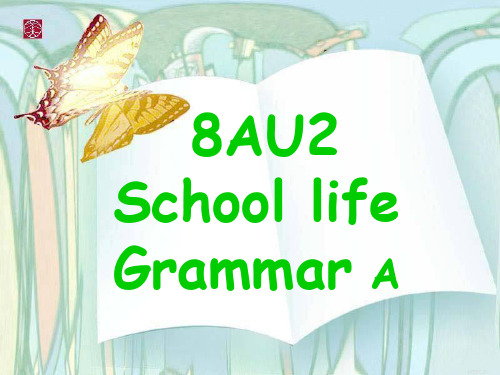
Amy
Daniel
Sandy
Simon
What advice would you like to give them ?
spend …money read …books
join …clubs do … housework
play computer games
Amy should __________________________.
I
50¥
Kate
100¥
I have l_es_s__ money t_h_a_n_ Kate. Kate has m_o_r_e_ money t_ha_n__ I .
Hobo has more bread t_h_a_n_ Eddie. Eddie has less bread t_h_a__n_ Hobo.
A survey
spend …money read …books play computer games
join …clubs do … housework
Amy
Daniel
Sandy
Simon
A survey
spend …money read …books
join …clubs do … housework
AmSyipmlaoynsdtoheesfethweemstocsotmhpouutseerwgoarmk eosf tohfethfoeufro/ualrl/.all. Simon joins the most clubs of the four/all.
SaDnadnyiejlodinosesthtehefelweaesstt hcoluubssewofotrhkeoffotuhre/aflol.ur/all.
新译林8A英语UNIT 5单元知识点归纳及练习题(含答案)
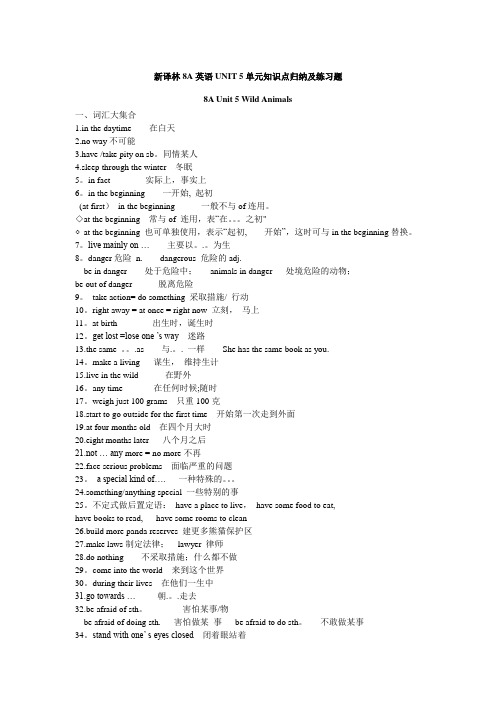
新译林8A英语UNIT 5单元知识点归纳及练习题8A Unit 5 Wild Animals一、词汇大集合1.in the daytime 在白天2.no way不可能3.have /take pity on sb。
同情某人4.sleep through the winter 冬眠5。
in fact 实际上,事实上6。
in the beginning 一开始, 起初(at first)in the beginning 一般不与of连用。
◇at the beginning 常与of 连用,表“在。
之初"◇at the beginning 也可单独使用,表示“起初, 开始”,这时可与in the beginning替换。
7。
live mainly on … 主要以。
.。
为生8。
danger危险n. dangerous 危险的adj.be in danger 处于危险中;animals in danger 处境危险的动物;be out of danger 脱离危险9。
take action= do something 采取措施/ 行动10。
right away = at once = right now 立刻,马上11。
at birth 出生时,诞生时12。
get lost =lose one ’s way 迷路13.the same 。
.as 与.。
. 一样She has the same book as you.14。
make a living 谋生,维持生计15.live in the wild 在野外16。
any time 在任何时候;随时17。
weigh just 100 grams 只重100克18.start to go outside for the first time 开始第一次走到外面19.at four months old 在四个月大时20.eight months later 八个月之后21.not … any more = no more不再22.face serious problems 面临严重的问题23。
人教版英语八年级上Unit 5-6知识清单

八上Unit 5-6知识清单一、单词扩展cate (v.) 教育→education(n.)教育→educational (adj.)教育的,有教育意义的2.discuss (v.)讨论→discussion (n.)讨论,商量3.expect (v.)预料,期待→unexpected(adj.)难以预料的→expectation(n.) 期待4.mean (v.)意思是→meaning (n.)意思,含义→meaningful(adj.)有意义的→meaningless(adj.)毫无意义的;意思不明确的5.act (v. & n.)行动→action(n.)行动→actor (n.)演员,男演员→actress (n.)女演员6.culture (n.) 文化→cultural (adj.)文化的7.fame (n.)名声→famous (adj.)著名的;出名的8.appear (v.) 出现→disappear(v.)消失→appearance (n.)外表,露面,出现9.succeed (v.) →success(n.)→successful(adj.)成功的→successfully(adv.)成功地10.luck (n.) 幸运→lucky(adj.幸运的→unlucky(adj.)不幸的→unluckily(adv.)不幸地mon (adj.) 普通的,常见的→uncommon(adj.)不常见的12.simple(adj.)简单的→simply(adv.)简单地13.medicine (n.) 药;医学→medical(adj.)医学的14.foreign (adj.) 外国的→foreigner (n.)外国人15.improve (v.)改进,改善→improvement (n.)改进,改善16.agree (v.) 同意→disagree(v.)不同意→agreement(n.)同意17.relate (v.) 联系,关联→relation(n.)关系→relationship(n.)关系,联系二、必背短语1.don’t mind sth/doing sth不介意某事/做某事2.can’t stand sb/sth不能忍受某人/某事3.learn…from从…学习4.plan to do sth计划做某事5.hope to do sth 希望做某事6.find out发现,查明e out出版,发行8.expect to do sth期待做某事9.think of 想起,认为10. try to do sth.尽力做某事try doing sth. 尝试做某事11.such as 例如12.be ready to do sth 准备着做某事13.try one’s best尽某人最大努力14.dress up like/as 打扮成,装扮成15.take one’s place代替某人的位置16.do a good job干得好17.grow up长大,成长18.be good at在……方面擅长19.keep on doing sth坚持做某事20.be sure about sth对…确信的21.make sure 确保22.take acting/singing lessons 上表演/歌唱课23.go to a cooking school 上烹饪学校24.make promises to sb 向某人作出承诺25.at the beginning of 在…开始26.write down 写下27.have to do with sth 和…有关28.take up 开始从事三、重点句子1.-Do you want to watch the news? Yes, I do.你想看新闻吗?是的。
牛津译林版八年级英语上册Unit5--6单元基础卷(含答案)-

译林牛津英语8Aunit5基础卷一、词汇运用。
1.All the__________(hunt)in that small village used to lived on hunting.2.Many animals__________(live)areas are becoming farmland.3.The students of Class 5 are writing an___________(invite)letter to Mr.Wu.4.Good friends should share_____________(happy)with each other.5.Mr Wu received many presents on Teachers’Day , but he_________(接受)none.6.He is so kind that he often takes___________(同情)on the poor people.7Usually______________(狼)catch small animals for their food.8.__________________(保护区)are good places for wild animals to live.【答案】hunters living invitation happiness accepted pity wolves Reserves二、动词填空。
1. The Greens decided_______(move) to Canada because Mr Green found a job there.2. Call me when you_______(arrive) in Shanghai.3. "Do you enjoy_______(be) with us?" they asked me.4. A tiger_______(kill) a small animal if it is hungry.5. The soup_______(smell) sweet. I'm sure it's delicious.6. We failed_______(walk) through this mountain. But we will try this summer again.7. Last week Tom met Sandy in the street and stopped_______(talk) with her.8. The car hurt him. He_______(lie) in bed at home now.【答案】1. to move2. arrive3. being4. will kill5. smells6. to walk7. to talk8. is lying三、完成句子。
Unit 6 Grammar教案 牛津译林初中英语八年级上册
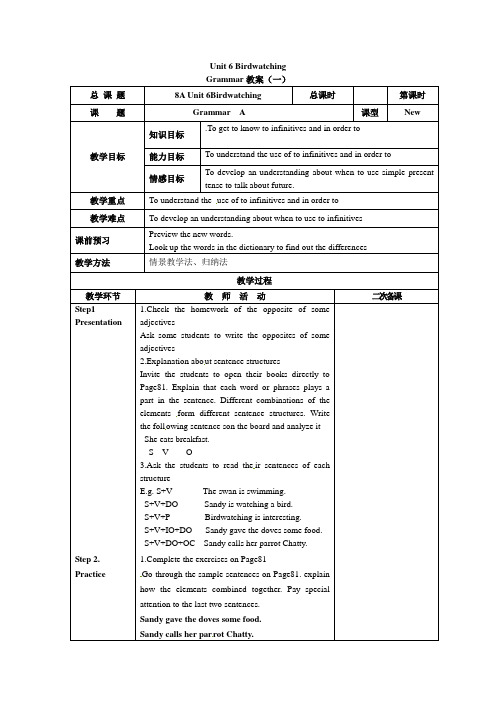
Unit 6 BirdwatchingGrammar教案(一)总课题8A Unit 6Birdwatching 总课时第课时课题Grammar A 课型New教学目标知识目标.To get to know to infinitives and in order to能力目标To understand the use of to infinitives and in order to情感目标To develop an understanding about when to use simple presenttense to talk about future.教学重点To understand the use of to infinitives and in order to教学难点To develop an understanding about when to use to infinitives课前预习Preview the new words.Look up the words in the dictionary to find out the differences教学方法情景教学法、归纳法教学过程教学环节教师活动二次备课Step1 PresentationStep 2. Practice 1.Check the homework of the opposite of some adjectivesAsk some students to write the opposites of some adjectives2.Explanation abo ut sentence structuresInvite the students to open their books directly to Page81. Explain that each word or phrases plays a part in the sentence. Different combinations of the elements form different sentence structures. Write the foll owing sentence son the board and analyze it She eats breakfast.S V O3.Ask the students to read the ir sentences of each structureE.g. S+V The swan is swimming.S+V+DO Sandy is watching a bird.S+V+P Birdwatching is interesting.S+V+IO+DO Sandy gave the doves some food. S+V+DO+OC Sandy calls her parrot Chatty.plete the exercises on Page81Go through the sample sentences on Page81. explain how the elements combined together. Pay special attention to the last two sentences.Sandy gave the doves some food.Sandy calls her par rot Chatty.Step 3. PresentationStep4. ProductionStep5. Homework 2. Make some sentences a ccording to the former part of the unit and get them to analyze.3. Show another group of sentences and get the studen ts to decide the sentence str ucture.1. Have a free talk and elicit the use of simple present, talking about programmers, timetable, calendars .2. Talk about the schedule for tomorrow with simple present tense.1. (Organizing a school trip)Talk about the timetable on Page82. Complete the notes on Page 83 using the simple present tense of verbs in brackets.2.Talk about the schedule using simple present tenseTIME ACTIVITIES6:30 The first underground leaves8:00-10:00 Give lessons to Class1 and Class2 11:00 Meet my friends from Xiamen12:00 Have lunch with my friends13:00 Return to school13:30 Have a meeting16:00 Meet some parents in the office 19:00 Watch Ji XiaolanFill the bla nks with proper forms of the given verbs according to the schedule.3. Make a summary to the use of simple present tense.1. Recite the note about organizing a school trip on Page83.2. Complete the relative exercises.3. Make five more sentences according to the sentence structures.4. Preview Grammar C教学反思Grammar教案(二)教学内容8Aunit6 Birdwatching Grammar 二次备课教学目标1. To use to-infinitives for pu rpose2. To learn to use verbs+objectives+to-infinitives重点难点Key points:To use to-infinitives for purposeDifficult points:To learn to use verbs+objectives+to-inf initives教学流程设计教学流程设计Step1.Lead-in (guessing)Step2.Finding rules and fill in the table.1.Teacher let students say which syntax-function the underline parts play.2.Students answer and fill i n the following table in group. Step3.Presentation1. Use to-infinitives for purposee.g.He sat dow n to have a rest.Ask Ss to give more examples.2.Tell Ss that we can use in orde r to to expres s purpose.This is more formal than usi ng to-infinitives.Ask Ss to change the sentences with in order to.People go to Zhalong in order to watch the birds.They should read abou the bird first in order to learn more about them.ing verbs+objects+to-i nfinitives不定式做宾语补足语Show the Ss more examples :The policeman asked the boys not to play football on the road. The teacher told me to come to school earlier next time.Ask the Ss to find more verbs that can be used in this way. The teacher asked him to speak louder.I notice her enter the roo m:Have a summary吾(五)看(see. watch.notice.observe.look at)三室(使)(let.make.have),两厅(听)(hear.listen to),一感觉feel,不太土toStep4 ProductionAsk the Ss to finish exercisesStep5 Homework课题Unit 6 Grammar 课时课型新课教学目标1.To master the constructions of to-infinitives for purpose and verbs+objects +to-infinitives.2.To understand and use them correctly.重、难点1.To master the constructions of to-infinitives for purpose and verbs+objects +to-infinitives.2.To understand and use them correctly.教学设计详案二次备课内容Step1. Show learning aims. (1')Step2. Guide students to learn and understand the construction of to-infinitives for purpose.1.Read the following sentences and say about to-infinitives in them.(3')(1).When she was six months old, she began to eat bamboo.(2).Please remember to bring your homework tomorrow.(3).We hope to get good grades in this midterm exam.(4).I often go to the market to watch the birds.(5).Now the Chinese government has made laws to prevent all these things.T says: 动词不定式不仅可以位于某些动词后做其宾语,如:(1).(2).(3),而且可以作目的状语。
苏教版 牛津 译林版 初二 8A Unit5 重要知识点
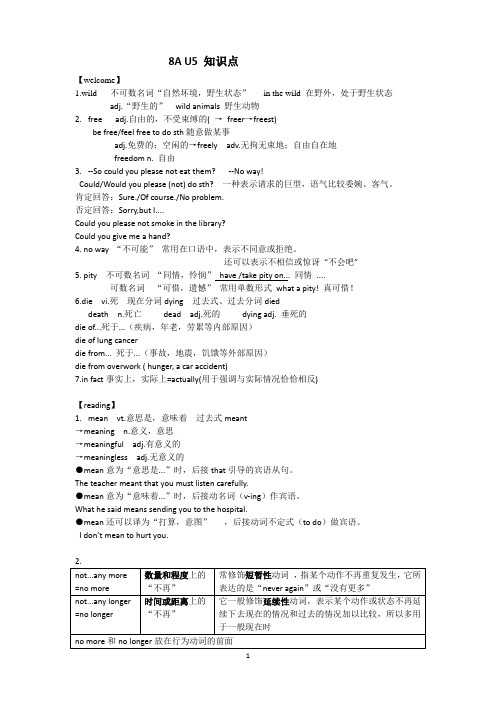
8A U5 知识点【welcome】1.wild 不可数名词“自然坏境,野生状态”in the wild在野外,处于野生状态adj.“野生的”wild animals 野生动物2.free adj.自由的,不受束缚的( →freer→freest)be free/feel free to do sth随意做某事adj.免费的;空闲的→freely adv.无拘无束地;自由自在地freedom n. 自由3.--So could you please not eat them? --No way!Could/Would you please (not) do sth? 一种表示请求的巨型,语气比较委婉、客气。
肯定回答:Sure./Of course./No problem.否定回答:Sorry,but I....Could you please not smoke in the library?Could you give me a hand?4. no way “不可能”常用在口语中,表示不同意或拒绝。
还可以表示不相信或惊讶“不会吧”5. pity 不可数名词“同情,怜悯”have /take pity on... 同情....可数名词“可惜,遗憾”常用单数形式what a pity! 真可惜!6.die vi.死现在分词dying 过去式、过去分词dieddeath n.死亡dead adj.死的dying adj. 垂死的die of...死于...(疾病,年老,劳累等内部原因)die of lung cancerdie from... 死于...(事故,地震,饥饿等外部原因)die from overwork ( hunger, a car accident)7.in fact事实上,实际上=actually(用于强调与实际情况恰恰相反)【reading】1.mean vt.意思是,意味着过去式meant→meaning n.意义,意思→meaningful adj.有意义的→meaningless adj.无意义的●mean意为“意思是...”时,后接that引导的宾语从句。
(牛津译林)中考英语首轮复习课件8A Unit (5-6)
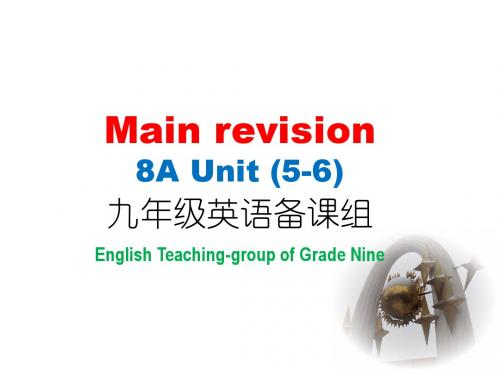
8A Unit (5-6)
九年级英语备课组
English Teaching-group of Grade Nine
•词句训练 •专题训练 •语法训练 •其他训练
1. 2.
去观鸟 尖尖的翅膀
go birdwatching pointed wings need you to help me fly to southern countries a nature reserve in north-east China/ in the north-east of China one of the most important wetlands provide them with shelter/ provide shelter for them an ideal home stay there for a short time/ go there for a short stay all year around make enough room for…
除了等什么也不能做 can do nothing but wait
10. 分发饮用水 11. 堆雪人 12. 被…覆盖 13. 着火 14. 匆忙做某事
重点词句练习
《中考指要》P. 24 P. 25
Part One Part Four
ห้องสมุดไป่ตู้
Use correct forms to fill in the blanks. important,unable happy, able, necessary, regular,
hear a loud noise like thunder
calm down look at each other in fear
牛津译林版英语8A Unit 5 重点短语和句子

牛津课本八年级 U5 重点知识归纳一、词组或短语1. 生活在野外2. 不可能 l ive in the wi ld no way3. 同情穷人 have / t ake p i ty on poor peop lein fac t4. 实际上,事实上5. 动物世界之王6. 称他为圣诞老人7.看起来像只白老鼠8.重 100 克 the k ings o f the an i mal wor ldca l l h im Fa ther Chr i s tmaslook l ike a whi te mouseweigh 100 g rams9.开始第一次走出她的家门 10.不再… s ta r t to go ou t s ide her home for the f i r s t t imenot… any more11.一开始 in the beg inn ing12.面对严重的问题 face se r ious p rob lems13.主要以吃一种特殊的竹子为生 live main ly on a spec ia l k ind o f bamboo14.因此 as a resu l t15.有住的地方 have a p lace to l ive(be) in danger16.处在危险之中 17.采取措施干某事 18.立刻,马上 t ake ac t ion to do s t hr igh t away=a t oncebui ld more panda r eservesmake l aws to p ro tec t pandasl ea rn to look a f t e r herse l fcome in to the wor l d as a babyge t s i ck19.建造更多的熊猫保护区 20.制定法律保护熊猫 21.学会照顾她自己 22.出生/ 出世 23.生病 24.出生时,诞生时 25.半年 a t b i r thha l f a year26.害怕做某事 be a f ra id o f do ing s ths leep with one’s eyes closedget lost=lose one’s waywork ou t a maths prob lemwork i t /them ou t27.闭着眼睛睡觉 28.迷路 29.解答一道数学题 30.解决它/它们 31.在老师的帮助下 32.与…同样 with the he lp o f the t eacherthe same ---as33.一会儿 fo r a shor t whi le34.捉老虎取它们的皮毛和骨头 35.身体的其它部分 36.以团队形式一起工作 37.对人有危险 ca tch t ige r s fo r thei r fu r and bonesother pa r t s o f the bodywork as a t eambe dangerous to humansfewer and fewer l i ving a reaski l l fo r fun38.越来越少的生存区域 39.为取乐而杀害 40.失去生命 lose one’s life=dieneed our p ro tec t ion41.需要我们的保护42.有快乐和悲伤的感觉 43.谢谢你的好意 have fee l ings o f happiness and sadnessthank you fo r your kindnessaccep t our inv i ta t ion44.接受我们的邀请 45.一份有关处于危险中的动物的报告 a repor t on an an i mal in dangerm ove a round s lowlyin the day t imes leep th rough the winte r46.四周慢慢地走走 47.在白天 48.整个冬天睡觉 二、重点句子及句型:1. 你愿意生活在野外吗?W ould you l ike to l ive in the wi ld?2.你最喜欢什么野生动物?(2 种)W hat wi ld an imal do you l ike bes t? = What i s your favor i t e wi ld an imal?3. 当“希望”出生时,她只有 100 克。
牛津深圳版:2020年中考英语一轮单元知识复习八年级上册 Units 5-6 学案设计
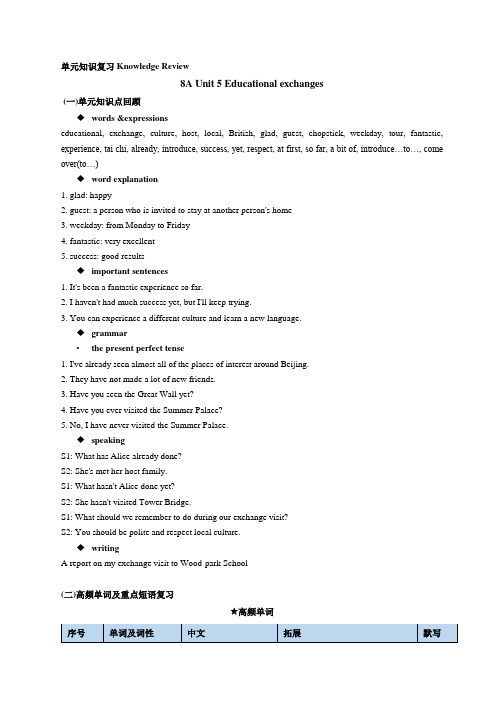
单元知识复习 Knowledge Review8A Unit 5 Educational exchanges(一)单元知识点回顾◆words &expressionseducational, exchange, culture, host, local, British, glad, guest, chopstick, weekday, tour, fantastic, experience, tai chi, already, introduce, success, yet, respect, at first, so far, a bit of, introduce…to…, come over(to…)◆word explanation1. glad: happy2. guest: a person who is invited to stay at another person's home3. weekday: from Monday to Friday4. fantastic: very excellent5. success: good results◆important sentences1. It's been a fantastic experience so far.2. I haven't had much success yet, but I'll keep trying.3. You can experience a different culture and learn a new language.◆grammar•the present perfect tense1. I've already seen almost all of the places of interest around Beijing.2. They have not made a lot of new friends.3. Have you seen the Great Wall yet?4. Have you ever visited the Summer Palace?5. No, I have never visited the Summer Palace.◆speakingS1: What has Alice already done?S2: She's met her host family.S1: What hasn't Alice done yet?S2: She hasn't visited Tower Bridge.S1: What should we remember to do during our exchange visit?S2: You should be polite and respect local culture.◆writingA report on my exchange visit to Wood-park School(二)高频单词及重点短语复习★高频单词重点短语(三)单词拼写1. We have a_______ learnt some history from the elders. It’s interesting.2. Many foreigners are interested in Guangzhou’s c______ and history.3. You can go to the Cantonese Temple Fair to taste l_____ food of Guangzhou.4. The educational exchange is a great s______!5. I am g___ to introduce you to my friend Li Ming.6. Our trip to London is a f_______ experience. We all had a good time there.(四)完成句子1. 现今,与其他城市的好朋友保持联系很方便。
牛津译林版-8A-Unit2语法精讲
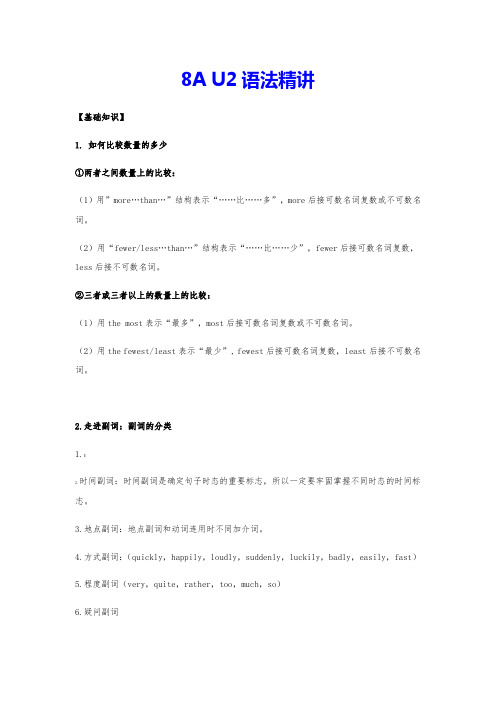
8A U2语法精讲【基础知识】1. 如何比较数量的多少①两者之间数量上的比较:(1)用”more…than…”结构表示“……比……多”,more后接可数名词复数或不可数名词。
(2)用“fewer/less…than…”结构表示“……比……少”,fewer后接可数名词复数,less后接不可数名词。
②三者或三者以上的数量上的比较:(1)用the most表示“最多”,most后接可数名词复数或不可数名词。
(2)用the fewest/least表示“最少”, fewest后接可数名词复数,least后接不可数名词。
2.走进副词:副词的分类1.$2.时间副词:时间副词是确定句子时态的重要标志,所以一定要牢固掌握不同时态的时间标志。
3.地点副词:地点副词和动词连用时不同加介词。
4.方式副词:(quickly,happily,loudly,suddenly,luckily,badly,easily,fast)5.程度副词(very,quite,rather,too,much,so)6.疑问副词7.关系副词(when where why)8.频率副词3. 副词比较级和最高级的构成:(1)规则变化:比较级:A."B.单音节,在词尾加-er,fast-faster, hard-harder, loud-louderC.以字母e结尾的副词,加-r,late-laterD.以辅音字母+y结尾的副词,先变y为i,再加-er,early-earlierE.部分双音节副词和多音节副词,前面加more,carefully-more carefully,politely-more politely最高级:最高级也一样,只是将-er换成-est,more换成most而已。
(2)不规则变化:well-better-best badly-worse-worst far-farther-farthest4.副词比较级的用法:A+…副词的比较级+than B.当than前后使用的动词相同时,通常用do的某种形式代替后面的动词,该词可以省略。
新版8A牛津英语unit6 知识点

教学目标:本单元知识点与语法讲解Welcome:1.I often go to the market to watc h the birds.我经常去市场观鸟.watch the birds= go birdwatching意为“观鸟,看鸟"。
to watch the birds是动词不定式作目的状语,对目的状语提问用why。
—Why did you get up so early this morning?-To catc h the first train.表示“去某地"有三种情况:(1)go+表示地点的副词there,home等。
(2)go+to+表示地点的名词。
go to school上学go to work上班go to college上大学(3) go+to+the+表示地点的名词。
go to the factory去工厂go to the park去公园探究点二:look,see和watch有何区别?(1)从词义上看:look通常表示主动地、有意识地“看",侧重指看的行为;(动作)see通常指看的客观结果,即“看见”;(结果)watch也指有意识地看,但往往指仔细地盯着事物的变化.(过程)I looked hard but saw nothing。
If you watch (look)carefully, you will see how I do it。
(2)从是否及物来看:①look通常为不及物动词,若接宾语,其后须接介词(如:at,for,after等)。
Look at the blackboard.②see可用作及物或不及物动词。
It was so dark that I could hardly see (it).③watch通常为及物动词。
Did you watch the tennis match?(3)从时态上看:look和watch可用于进行时态,而see作为感官动词,一般不用于进行时态.但有时表示有意识的行为(如表示“看望"、“会见”、“陪送”等),也可用于进行时态.He is seeing his friend off。
牛津译林版八年级上册江苏省英语期末复习8AUnit5-Unit6综合复习训练(含答案)

2019—2020学年第一学期牛津译林版八年级上册英语期末复习8AU5-U6综合复习训练一、单项选择1. I can't tell you way to the Wilson because we don't have Wilson here in the village.A. the;aB. a;/C. a;theD. the;/2. To make your DIY work perfect, you’d better not start _______you get all the tools ready.A. whenB. whileC. beforeD. after3. — Two tickets for Sunday, please! —Sorry, There’s _________left.A. nothingB. noneC. somethingD. anything4. The world __________ not be ready for me, but ready or not, I am here now.A. mayB. needC. shouldD. must5. The number of the factories in our hometown is getting ________and more and more peoplecome to work here.A.less and lessB. fewer and fewerC. bigger and biggerD. smaller and smaller6. He took a notebook with him in order to what he saw and heard.A. break downB. write downC. cut downD. calm down7. The mother was worried the baby kept .A. because; cryingB. because of; to cryC. because of; cryingD. because; cried8. —Do you enjoy the singer’s songs?—Yes. I enjoy his voice best. I can’t think of anyone with a ____ voice.A. worseB. bestC. worstD. better9. —How do you find the newspaper TEENS?—Good indeed. It _____ many news stories around the world.A. showsB. coversC. writesD. says10. When Xi Wang was ______ , she started to go outside for the first time.A. four months oldB. four month oldC. four-month-oldD. four-months-old11. There are about ______ visitors going to the wetland part every year.A. thousand ofB. thousands ofC. three thousandD. three thousands of12. Dad often me to read books if I don’t do well in writing.A. makesB. hopesC. advisesD. lets13. The roast chicken smells , so it sells .A. bad, badlyB. badly, badlyC. bad, badD. badly, bad14. ——English is difficult, I nearly give it up.——Please don’t. Nothing is_________ if you put your heart into it.A. importantB. impossibleC. interestingD. incorrect15. The students had different ideas. _________, they didn’t make a decision.A. Instead ofB. As a resultC. Because ofD. By the way16. --- How much does a young panda_______?---Its ____ can be 35 kilograms.A .weigh, weight B. weigh, weigh C. weight, weight D. weight, weigh17. Dennis doesn’t paint others, but his ideas are the most wonderful of all.A. as careful asB. so carefully asC. more careful thanD. less careful than18. I like learning English because the language sounds beautiful. , it is also very useful.A. OtherwiseB. HoweverC. MoreoverD. Instead19. 一Why do some wild birds fly to the south?一from the cold winter here.A. HideB. HidesC. To hideD. Hiding20. ﹣Hurry up, Jeff! Let's cross the road as fast as possible.﹣No, you ____. Don't you see the light is still red?A. couldn'tB. wouldn'tC. mustn'tD. needn't21. 一Many wild animals lose their lives because people hunt them.一We should them.A. take a pity toB. have a pity onC. have pity toD. take pity on22. 一is it from the Children's Palace to Xingfu Temple, Tom?一About 10 minutes by bus.A. How soonB. How longC. How muchD. How far23.―What is David like?―.A. He likes swimming.B. He is an artist.C. He is at school.D. He is tall and thin.24.-We should have pity children living in poor areas.-That's why I raise money Project Hope.A. on; forB. about; toC. with; fromD. in; for25.一How much do we need to pay for the cooking course?一Don't worry! It's free. and we will the tools for you.A. practiseB. protectC. provideD. prevent26. --Are you sleepy when _______.--No, I am not. I know when_______ to have a rest.A. driving; stoppingB. driving; to stopC. to drive; stoppingD. to drive; to stop27. --Is there_______ in today's newspaper?--Yes. Premier Li went to see_______ "stay-home children" on December 25th.A. anything special; hundred ofB. something special; hundred ofC. special anything; hundreds ofD. anything special; hundreds of28. You need to take notes at the meeting, so make sure a pen and some paper with you.A. bringingB. to bringingC. to bringD. not to bring29. —Who taught math while you were ill at home?—I taught .A.your;meB. you;myselfC. you;meD. your;myself30. —Rose, we will start at six tomorrow morning. Don't be late, will you?一. I will be there on time.A. No, I willB. Yes, I willC. No, I won'tD. Yes, I won't二、词汇运用A.根据所给中文,写出单词的适当形式。
译林版牛津英语8A Unit 5 单词知识点讲解
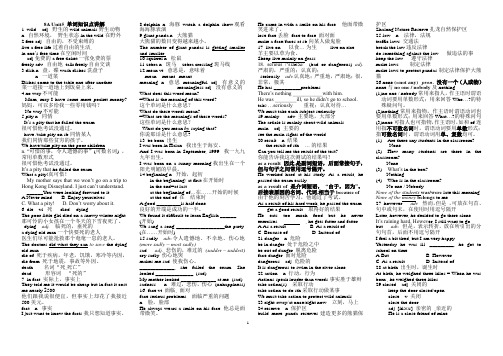
8A Unit5 单词知识点讲解1. wild adj. 野生的wild animals野生动物n. 自然环境,野生状态in the wild在野外2.free adj. 自由的,不受束缚的live a free life过着自由的生活,in one’s free time在空闲时间adj.免费的a free ticket一张免费的票freely adv. 自由地talk freely自由交谈3.dish n. 盘,碟wash dishes洗盘子n. 一道菜Dishes come to the table one after another.菜一道接一道地上到饭桌上来。
4.no way不可能--Mum, may I have some more pocket money?妈妈,可以多给我一些零用钱吗?--No way.不可能5.pity n. 同情It’s a pity that he failed the exam.很可惜他考试没通过。
have /take pity on sb同情某人我们同情那些贫穷的孩子。
We have/take pity on the poor children.n. “可惜的事,令人遗憾的事”(可数名词) ,常用单数形式很可惜他考试没通过。
It’s a pity that he failed the exam.What a pity!真可惜!---My mother says that we won’t go on a trip to Hong Kong Disneyland. I just can’t understand. ---______You were looking forward to it.A.Never mind.B. Enjoy yourselves.C. What a pity!D. Don’t worry about it.6. die vi. 死died -- dyingThe poor little girl died on a snowy winter night.那可怜的小女孩在一个冬天的下雪夜死了。
八年级上册英语(苏教版八年级)8AU8 Grammar语言点

八年级上册英语(苏教版八年级)8AU8 Grammar语言点八年级上册英语(苏教版八年级)8au8grammar语言点一、短语:一.一场暴风雪袭击了阳光小镇。
asnowstormhitsunshinetown.多可怕的暴风雪啊!3.走到公共汽车站4.看见某人站在路边5.在路边onthesideoftheroad;在路一边ononesideoftheroad跑向他们跑向他们跑开打个大雪球等出租车二.语法:1.过去进行时主要表示:在过去某一时刻正在进行的动作;在过去某段时间一直在进行的动作2.过去进行时的句式1)基本结构:was/were+v-ing2)肯定句:主语+was/were+v-ing3)否定句:was/werenot+v-ingwasnot=wasn’t;werenot=weren’t4)疑问句:将was/were移到主语前回答:yes,主语+was/were.no,主语+wasnot/wasn’t.werenot/weren’t.5)特殊疑问句:疑问词+was/were+主语+v-ing (3)常与表示过去的某一点或一段时间状语连用,如:atthatmoment;at2:30p.m.yesterday;atthistimelastsunday;at9:05yesterdaymorning;f rom10to11yesterdaymorning,then等;或者与when,while,as引导的过去时间状语连用。
四.when/while/as1.连接两个同时发生的连续长动作时,通常使用引导。
(主控和从控,使用时)whileiwaswatchingtv,liewasreadingabookwhileeddiewassl eeping.2.如果短暂性的动作是主句时,我们可以用when,while或as引导。
(主短,when,while,as)when/while/asmilliewaswatchingtv,andycameintotheroom.3.如果连续动作是主句,我们经常使用when to connect。
译林版英语八年级上册8AUnit 5-6单元练习(单选、词汇、翻译)含答案

译林版8AUnit 5-6单元练习(单选、词汇、翻译)含答案第一部分一、单项填空( )1.All of us know giant pandas only live in_____________.A.England B.China C.Japan D.Australia( )2.一How did he finish his homework?m一I hear that he did it_____________.A.on his own B.in the ownC.of the own D.all the own( )3.The meat smells bad_____________ ,please.A.take away it B.take it awayC.bring it away D.bring away it( )4.There_____________ a large number of students in our schoo1.The number of the students_____________ over three thousand.A.is;is B.is;are C.are;are D.are;is( )5.My grandfather is very old.He lives________.He sometimes feels________.We Should often go to see him.A.alone;alone B.alone;lonelyC.1onely;lonely D.1onely;alone( )6.I don’t know if my friend________here tomorrow.If she________,1 willtell you.A.comes:comes B.will comes;will comesC.will come;conies D.comes;come( )7.After class the students went out of the classroom one after________.A.other B.the otherC.others D.another( )8.1f we keep________the land,the farmers will have________to live.A.took;any where B.taking;nowhereC.take;no place D.bring;some where( )9.________did the baby panda look like?A.What B.How C.Where D.When( )10.If________a meeting this afternoon,we won’t go to the Zoo.A.there will be B.there hasC.there is D.there will have( )11.You will find________useful to learn even a little English.A.it B.thatC.this D.They( )12.Is there________in today’s newspaper?A.everything special B.special nothingC.anything special D.special something( )13.Let’s enjoy the song yesterday once more.It sounds________.A.well B.sadly C.badly D.Wonderful( )14.一I am going to the post office this Sunday.一________you go there,please buy some stamps for me.A.While B.If C.Before D.What( )15.When Xi Wang was a________panda,she started to eat bamboo shoots.A.six—month.old B.six—month oldC.six—months—old D.six month old一、1.B 2.A 3.B 4.D 5.B 6.C 7.D 8.B 9.A 10.C 11.A 12.C 13.D14.B 15.A二、词汇检测根据下列句子及所给汉语注释或通过上下文,写出空缺处各单词的正确形式。
- 1、下载文档前请自行甄别文档内容的完整性,平台不提供额外的编辑、内容补充、找答案等附加服务。
- 2、"仅部分预览"的文档,不可在线预览部分如存在完整性等问题,可反馈申请退款(可完整预览的文档不适用该条件!)。
- 3、如文档侵犯您的权益,请联系客服反馈,我们会尽快为您处理(人工客服工作时间:9:00-18:30)。
4.一部分形容词同时也是副词: 一部分形容词同时也是副词: e. g. long, far, high , fast, early, late, hard 5.特殊的形容词变为副词 e.g. good--- well,true—truly , 一部分形容词本身就是以“ 结尾 结尾,则 6.一部分形容词本身就是以“ly”结尾 则 不能再在词尾+ 不能再在词尾+“ly”,这时可用介词短语 这时可用介词短语 的形式来表示方式。 的形式来表示方式。 e.g. friendly, lively, lovely, lonely, likely
18. possible possibly ________ 19. terrible 20. gentle 21. correct 22. happy
terribly ________
________ gently ________ correctly ________ happily
Complete the article of Part C2 on P85.
Back
+ ly
写出下列各词的副词形式: 写出下列各词的副词形式: angrily 1. angry ______ 2. bad freely 3.free ______ 4. bright slowly ______ closely 7. close ______ heavily 9. heavy ______ 5. slow nicely 11. nice ______ 6. soft 8. clear 10. neat
对划线部分提问) She can sing songs beautifully. (对划线部分提问)
How can she sing songs?
How much do you know about adverbs of manners? (方式副词) 方式副词)
A. 定义: 定义: 表示说话者行事方式的副词,修饰动 表示说话者行事方式的副词 修饰动
•5.The students studied quietly in the library _____________________________________. (in/studied/the/library/quite) can speak three languages fluently •6.she_____________________________________. (speak/can/fluent/languages/three) working busily at the office •7.Mr. Wang is _________________________ (busy/the office/at/working) and will be late for dinner. •8.My parents _____________________(looked looked at me angrily at/angry/me) because I lied.
连词成句: (注意红色单词的词性变化 注意红色单词的词性变化!) 连词成句: (注意红色单词的词性变化!) 1. you can, at Beijing Wildlife Park, close, watch the birds 2. to your bird watching place first, walk, quiet 3. clear, make sure, from your birdwatching place, you can see 4. drop litter, careless, do not
问句。 词.常用来回答“how”问句。 常用来回答“ 问句
B. 构成: 构成: 大部分由形容词+ly构成 构成。 大部分由形容词+ly构成。 e.g.
quiet—quietly
C. 运用: 运用: 放在动词(短语 后或所修饰的动词之 放在动词 短语)后或所修饰的动词之 短语前表示来自事的方式。 前表示行事的方式。
III. 翻译句子.(注意区别形容词和副词用法 注意区别形容词 用法.) 注意区别形容词和副词用法
1.西蒙是个非常细心的学生 他写作业一直很认真 西蒙是个非常细心的学生.他写作业一直很认真. 西蒙是个非常细心的学生 他写作业一直很认真 Simon is a careful student. He does his homework carefully. 2.我们都有一个幸福的家,名字叫中国 我们过得很 我们都有一个幸福的 名字叫中国.我们过得很 我们都有一个幸福的家 名字叫中国 幸福. 幸福 We have a happy family called China. We live happily. 3.如果你吃得健康 你就会健康 如果你吃得健康 你就会健康. 如果你吃得健康,你就会健康 If you eat healthily, you’ ll be healthy.
5. soft, during the watch, you must talk, very 6. in the park., birds fly, happy 7. the birds, sing, nice 8. clear, for you to write your reports, it is important
Check the answers. (Part C3 on P85.)
1.At Beijing wildlife park, you can watch birds closely. 2.First, walk quietly to your birdwatching places. 3.Make sure you can see clearly from your birdwatching places. 4.Do not carelessly drop litter. 5.You must talk very softly during the watch. 6.Birds fly happily in the park. 7.The birds sing nicely. 8.It is important for you to write your reports clearly.
badly _______ brightly _______ softly ______ clearly ______ neatly ______
noisily __________ dangerously 13.dangerous __________ differently 14.different __________ 12. noisy 15. careful 16. generous 17. pleasant carefully __________ generously __________ pleasantly __________
The sun shonebrightly as we got on the school bus. We were all very excited. We talked loudly until Mr Wu told us to be quiet. When we arrived at Beijing Wildlife Park, the zookeeper greeted us politely. He told us about all the different birds, and we listened carefully . He told us not to make any noise and not to run. He also told us to walk slowly and not to frighten the birds. We saw many different birds at Beijing Wildlife Park and we learnt to tell people about them correctly .
Form the adverbs from the adjectives. 1.badly 1.gentle gently - e + y 2.brightly 2.possible possibly
3.clearly 4.closely 5.correctly 6.dangerous ly 7. generous ly 8. neatly 9. nice ly 10. pleasantly 11. slowly 12. soft ly 1.easy 2.happy 3.heavy 4.noisy 5.angry 1.good 2.true 3.hard 4.fast easily happily - y + ily heavily noisily angrily well truly hard fast
II. 连词成句:(注意单词的词性变化 注意单词的词性变化!) 注意单词的词性变化
•1.As the roads are wet, _____________________________________. he drives very carefully (very/drives/he/careful) •2.Traffic is busy and ______________________________________. the cars are moving slowly (are/the/slow/cars/moving) •3.We are staying home because it is raining heavily ______________________________________. (it/heavy/is/because/raining) •4.Bees _________________________________ always fly around busily (always/busy/fly around) looking for flowers.
